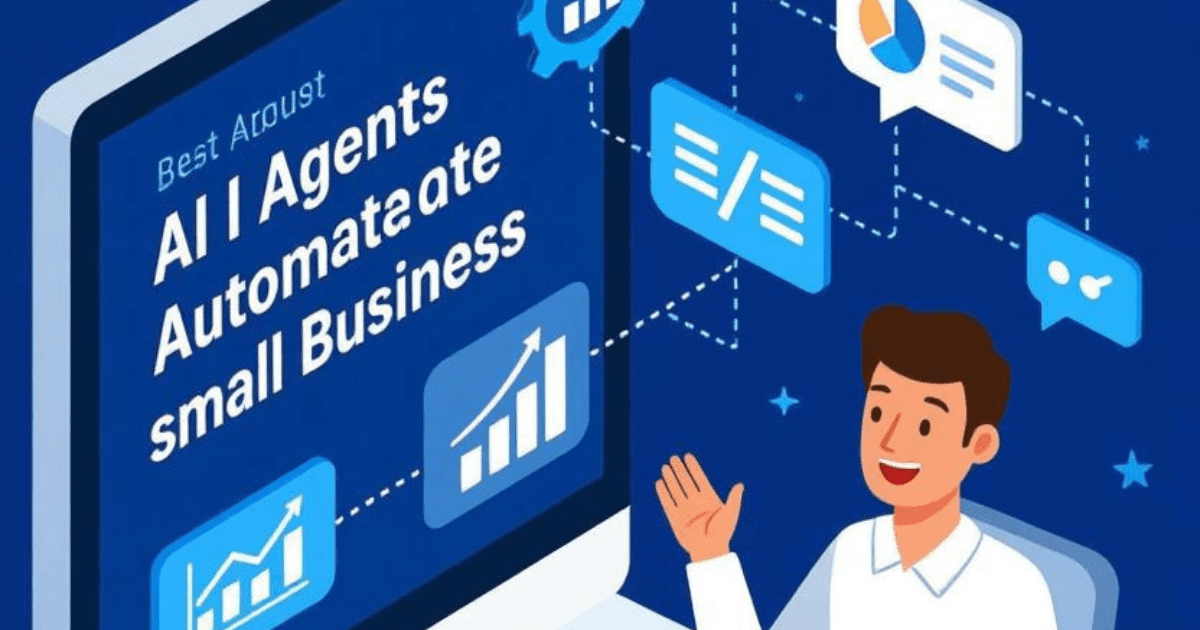Hey there, fellow entrepreneurs! If you’re running a small business, you know the drill: juggling a million tasks, wearing all the hats, and wishing for just a few more hours in the day. I remember when I first started my own side hustle—a little online store selling handmade crafts—the admin work alone nearly buried me. Emails piling up, inventory checks that took forever, and customer queries coming in at all hours. Sound familiar? Well, what if I told you that artificial intelligence isn’t just for big tech giants anymore? AI agents are stepping in to handle the grunt work, letting you focus on what you do best: growing your business and innovating.
In this blog post, we’re diving deep into how AI agents can revolutionize small business operations. We’ll cover what they are, the key benefits, real-world examples of tasks they can automate, steps for implementation, potential pitfalls, and a peek into the future. By the end, you’ll have a solid roadmap to get started. Let’s jump in!
What Are AI Agents, Anyway?
First things first: AI agents aren’t some sci-fi robots taking over your office. Think of them as smart software programs designed to perform tasks autonomously, learning from data and interactions to get better over time. Unlike basic automation tools (like simple scripts that run on a schedule), AI agents use machine learning, natural language processing, and sometimes even computer vision to handle complex, dynamic jobs.
For small businesses, these agents come in various forms—chatbots on your website, virtual assistants in your email inbox, or integrated tools in your CRM system. They’re built to mimic human decision-making but at lightning speed and without the coffee breaks. According to experts, AI agents can automate standardized processes with pinpoint accuracy, slashing errors and freeing up your team for higher-value work. They’re not just reactive; many are proactive, anticipating needs based on patterns in your data.
Take Salesforce’s AI agents, for instance—they handle everything from scheduling meetings to data entry, all while integrating seamlessly with your existing tools. Or consider platforms like Botpress, which let you build custom AI agents tailored to your niche, whether you’re in retail, services, or e-commerce. The beauty? You don’t need a PhD in computer science to use them. Many are plug-and-play, with user-friendly interfaces that even tech novices can navigate.
In essence, AI agents are like having an extra employee who’s always on, never complains, and scales with your business. But how exactly do they translate to real savings and efficiency? Let’s explore the benefits next.
The Big Benefits: Why Small Businesses Need AI Agents Now

Small businesses often operate on razor-thin margins, where every penny and minute counts. That’s where AI agents shine brightest. By automating repetitive tasks, they can cut operational costs by up to 30-40% in some cases, according to industry reports. Imagine reclaiming hours spent on data entry or invoice chasing—time you could redirect toward strategy or customer relationships.
One major perk is boosted productivity. Employees get to ditch the mundane stuff, leading to higher job satisfaction and lower turnover. Studies show that automating workflows with AI can enhance employee morale by allowing focus on creative, fulfilling work. For owners like you, this means a happier team and a more innovative business.
Then there’s customer experience. AI agents provide 24/7 support, personalizing interactions based on past behavior. A local bakery, for example, could use an AI chatbot to recommend products, handle orders, and even upsell—leading to increased sales without hiring extra staff. Data-driven insights are another game-changer; agents analyze trends to help you make smarter decisions, like optimizing inventory to avoid stockouts.
Cost savings extend beyond labor. AI reduces errors in processes like accounting, preventing costly mistakes. Plus, scalability is built-in—as your business grows, AI agents handle more volume without proportional cost increases. In a competitive market, this gives small businesses an edge over larger rivals who might be slower to adapt.
Of course, the proof is in the pudding. Let’s look at specific tasks where AI agents are making waves.
Task Automation in Action: Real Examples for Small Businesses
AI agents aren’t one-size-fits-all; they tackle a wide array of tasks. Here, we’ll break it down by department, with practical examples to spark ideas for your setup.

Customer Service and Support
Gone are the days of waiting on hold. AI-powered chatbots and virtual assistants handle inquiries instantly. For a small e-commerce shop, an AI agent can answer FAQs, track orders, and even process returns—all via your website or social media. Tools like those from Aisera go further, integrating with email to manage support tickets autonomously.
Picture this: A customer asks about sizing for your apparel line at 2 AM. The AI pulls from your knowledge base, suggests alternatives, and seals the deal with a discount code. Result? Happier customers and more sales. In fact, businesses using AI for customer service report up to 25% higher satisfaction rates.
Marketing and Sales
Marketing can be a black hole for time and money, but AI agents streamline it. They automate email campaigns, segment audiences, and personalize content. For instance, an AI tool could analyze customer data to send tailored promotions, boosting open rates by 20-30%.
In sales, agents qualify leads by scoring them based on engagement, freeing your team to close deals. A real estate agent might use AI to schedule viewings automatically, follow up on inquiries, and even generate reports on market trends. This not only accelerates the sales cycle but also uncovers opportunities you might miss.
Operations and Administration
Repetitive admin tasks are AI’s sweet spot. Agents handle scheduling, appointment booking, and even inventory management. A restaurant owner could deploy an AI to predict demand based on weather and historical data, optimizing stock levels and reducing waste.
Data entry? Forget it. AI extracts info from emails or forms and populates your systems automatically. For a consulting firm, this means seamless project tracking without manual updates.
Finance and Accounting
Money matters are critical, and AI agents ensure accuracy. They automate invoice processing, expense tracking, and even basic bookkeeping. Tools like those integrated with Workday can flag discrepancies and generate reports in seconds.
For tax time, AI agents compile data, suggest deductions, and ensure compliance—saving you from costly audits. Small retailers benefit hugely, as AI reconciles payments across platforms like Shopify and PayPal effortlessly.
Human Resources
Even solo operators deal with HR. AI agents manage employee onboarding, benefits queries, and time-off requests. In a growing team, they handle payroll calculations and performance reviews based on data.
For recruitment, AI screens resumes, schedules interviews, and even assesses cultural fit through chat interactions. This levels the playing field for small businesses competing for talent.
These examples show AI agents’ versatility. But how do you actually get them up and running?
Implementing AI Agents: A Step-by-Step Guide
Getting started with AI doesn’t have to be daunting. Here’s a practical roadmap tailored for small businesses.
- Assess Your Needs: Identify pain points. Use tools like surveys or time-tracking apps to pinpoint repetitive tasks. For example, if customer service is overwhelming, prioritize a chatbot.
- Choose the Right Tools: Start with affordable, user-friendly platforms. Salesforce Einstein, Microsoft Azure AI, or open-source options like Botpress offer scalable solutions. Look for integrations with your current software (e.g., QuickBooks for finance).
- Pilot and Train: Implement in one area first. Train the AI with your data—most platforms have guided setups. Test thoroughly; involve your team for feedback.
- Integrate and Monitor: Connect to workflows via APIs. Monitor performance with analytics dashboards. Adjust as needed; AI learns, but it needs oversight initially.
- Scale Up: Once proven, expand. Budget for ongoing costs like subscriptions (starting at $20/month for basic agents) and ensure data security with GDPR-compliant tools.
Implementation might take a few weeks, but ROI comes quick—many see payoffs in months. Pro tip: Partner with consultants if tech isn’t your forte; services like A3Logics offer custom setups.
Challenges to Watch Out For (And How to Overcome Them)
No tech is perfect. Common hurdles include initial costs, which can be mitigated by starting small and using free trials. Data privacy is huge—choose agents with strong encryption and comply with regulations.
There’s also the learning curve. Train your team; many platforms offer tutorials. Resistance to change? Highlight benefits like reduced workload to get buy-in.
Finally, AI isn’t infallible. It can make errors if data is poor, so maintain human oversight for critical decisions. Address these proactively, and you’ll minimize risks.
The Future: AI Agents and Small Business Evolution
Looking ahead, AI agents will get even smarter with advancements in multi-agent systems, where multiple AIs collaborate on complex tasks. Imagine an agent handling your entire supply chain, from ordering to delivery optimization.
For small businesses, this means competing globally without massive resources. Trends like voice-activated agents and predictive analytics will personalize experiences further, driving loyalty. Ethical AI use will be key, ensuring fairness and transparency.
In short, the future is bright—and automated.
Wrapping It Up: Time to Automate Your Way to Success
AI agents aren’t a luxury; they’re a necessity for small businesses aiming to thrive in a fast-paced world. From slashing costs and boosting efficiency to delighting customers and empowering your team, the upsides are immense. Start small, experiment, and watch your operations transform.
If you’re ready to dive in, check out resources like BCG’s guides or platforms mentioned here. What’s one task you’d love to automate? Drop a comment below—let’s chat! Remember, the best time to start was yesterday; the next best is today.

